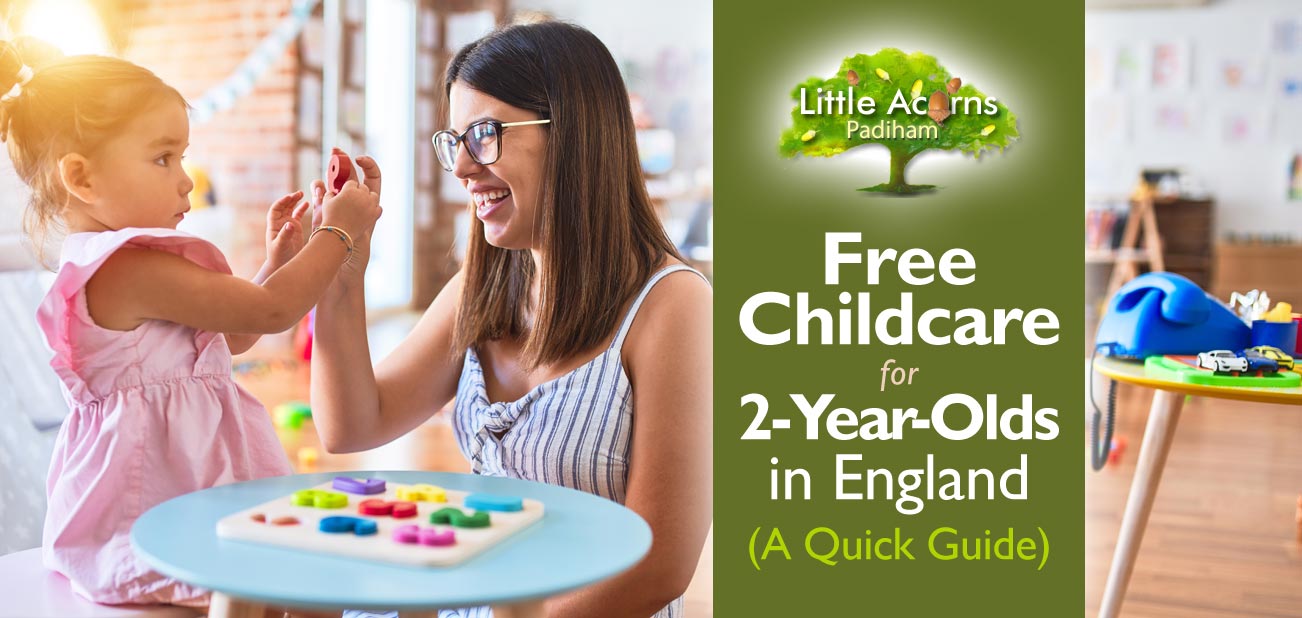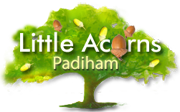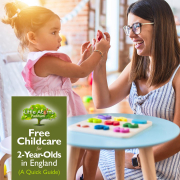
Today we explain the Government’s free childcare funding scheme for eligible 2-year-olds. While it’s not as universally available as the childcare funding scheme for 3- and 4-year-olds, there are still a significant number of children who will be able to benefit from this scheme for children aged two. And, by starting their early years education no later than this specific age, children are known to boost personal bests, social skills, cognitive development and even life outcomes — in many profound ways. (More information on the benefits of starting an early years education early is available here). What’s more, this particular funding is aimed at 2-year-olds that are disadvantaged in some way, so it can help to level up the playing field for them.
So, how does the scheme work, which 2-year-olds are eligible for the free funding and how do families access it? In today’s guide to Free Childcare for 2-Year-Olds in England, we explain everything you need to know and answer all such questions.
What Childcare Funding Can Eligible 2-Year-Olds Get?
 Eligible 2-year-olds can get a total of 570 free childcare hours during the course of a year. The entitlement is usually taken as 15 hours per week over 38 ‘term time’ weeks. However, families may wish to ask childcare providers if they can use the hours in a different way. For example, some may wish to stretch the hours out over 50 or so weeks of the year, in which case it would equate to approximately 11½ free hours per week. The nursery or childcare provider would need to confirm what’s possible. Any extra hours will need to be paid for by the family and the same is usually true for things like nappies, special trips and meals. Even so, 570 free childcare hours should really help families and may allow a stay-at-home parent to get back into the workplace sooner, even if only part-time.
Eligible 2-year-olds can get a total of 570 free childcare hours during the course of a year. The entitlement is usually taken as 15 hours per week over 38 ‘term time’ weeks. However, families may wish to ask childcare providers if they can use the hours in a different way. For example, some may wish to stretch the hours out over 50 or so weeks of the year, in which case it would equate to approximately 11½ free hours per week. The nursery or childcare provider would need to confirm what’s possible. Any extra hours will need to be paid for by the family and the same is usually true for things like nappies, special trips and meals. Even so, 570 free childcare hours should really help families and may allow a stay-at-home parent to get back into the workplace sooner, even if only part-time.
How is the Childcare Funding Accessed?
The funding is paid directly to the childcare setting, which must be an officially-registered provider and one that’s signed up to offer such free places. They must also be recognised by Ofsted as ‘Good’ or ‘Outstanding’. Nurseries, preschools, accredited childminders, Sure Start Children’s Centres and even some playgroups may be able to access the funding if they fit all the appropriate criteria. Contact your childcare provider about free childcare funding for your 2-year-old when you apply for a nursery place. If you are applying to Little Acorns Nursery in Padiham, you can apply for a place here. Your child can access the free childcare funding in the term that follows their 2nd birthday. Terms start in September, January and April.
1. Eligibility Criteria for Parents/Households
 Children aged two that live in England may be eligible if their parents/household are in receipt of one or more specific Government benefits. These include:
Children aged two that live in England may be eligible if their parents/household are in receipt of one or more specific Government benefits. These include:
- JSA (Income-based Jobseeker’s Allowance), which is an unemployment benefit that’s available while looking for work.
- Income-related ESA (Employment and Support Allowance), which people may be claiming if they have a reduced ability to work e.g. through disability or sickness.
- Income Support, which is a financial benefit aimed at those on low or non-existent incomes.
- Universal Credit with a maximum annual household income no greater than £15,400 after tax (excludes benefits). This is a benefit that helps people with living costs if they are on low incomes or out of work.
- The guaranteed part of Pension Credit, which may be available to help with living costs if you’re above State Pension age and have a low income.
- Working Tax Credit* and/or Child Tax Credit with an annual, before-tax, household income no greater than £16,190. These also help people on low incomes.
* Includes those claiming for the 4-week run-on payment that occurs when qualifying for Working Tax Credits ceases.
2. Eligibility Criteria for Disadvantaged Children
 If none of the benefit-related criteria above applies, children aged 2 may still qualify for the childcare funding scheme in the following circumstances:
If none of the benefit-related criteria above applies, children aged 2 may still qualify for the childcare funding scheme in the following circumstances:
- They receive Disability Living Allowance (DLA);
- They are subject to an EHC (Education, Health & Care) plan;
- A local authority looks after them;
- They have left care but are subject to a Child Arrangements Order, Special Guardianship Order, or Adoption Order.
3. Eligibility Criteria for non-UK Citizens Not Claiming Benefits
 The last category of eligible claimants is some 2-year-olds living in England who are non-UK citizens, whose households cannot claim benefits and whose household income is below a certain threshold. Thresholds vary from £26,500 to £38,600 depending on how many children the family has and whether they live inside or outside of London.
The last category of eligible claimants is some 2-year-olds living in England who are non-UK citizens, whose households cannot claim benefits and whose household income is below a certain threshold. Thresholds vary from £26,500 to £38,600 depending on how many children the family has and whether they live inside or outside of London.
- For those living in London, household income must be no more than £34,500 if you have one child or £38,600 if you have more.
- For those living outside London, household income must be no more than £26,500 if you have one child or £30,600 if you have more than one.
- Savings or investments must total no more than £16k in each case.
Your local council can give you more information.
Little Acorns Nursery & Preschool, Padiham
The Best Start for Your Baby, Toddler, or Preschooler in Padiham, Lancashire

Little Acorns is a nursery and preschool that offers the highest quality weekday childcare for babies and children under five. As well as offering them a home-from-home environment where they are loved and nurtured, we give every child a wonderful early years education. Our childcare professionals, equipment, facilities and curriculum will bring out the best in every child and give them the tools to thrive and be successful. If you would like to register for a childcare place, arrange a visit with your child, or discuss questions you may have, please simply get in touch and we’ll be happy to help:
Little Acorns Nursery is located in Padiham, Lancashire (BB12). As well as being convenient to families in Padiham, we may also suit those looking for a high-quality nursery or preschool in Hapton, Rose Grove, Burnley, Altham, Huncoat, Read, Simonstone, Sabden, Higham, or Wood End.
Information is understood to be correct at the time of writing (April 2023). Please check here for the latest information.

